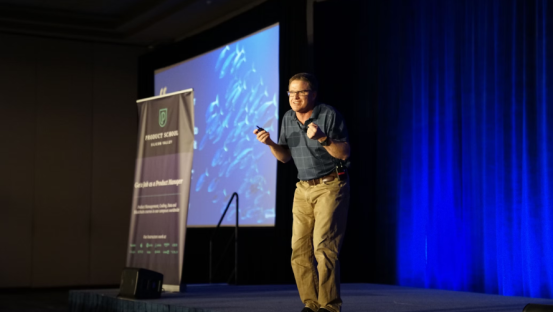Showcasing your expertise on your SpeakerHub profile

This article is part of our special series Great SpeakerHub profiles: How to make your profile more appealing to event organizers.
When it comes to hiring a speaker, all event organizers are fundamentally looking for the same thing—they want to be confident that when they hire you to speak on their stage that you will positively impact their audience.
The event organizer has to buy into you and your ability to impact with your message if you want to get hired to speak.
While there are no foolproof tricks that guarantee every event organizer will trust you and immediately want to hire you, there are a variety of things you can do to establish authority, avoid invalidating yourself, and showcase how your expertise has led you to where you are now, and how you can use that expertise to benefit their audience.
This article is going to look at the elements that help showcase your expertise, including presentations, workshops and past talks, and expertise tags.
Your expertise: what you can offer.
Once you’ve made a great impression, it’s time to talk about what you talk about.
The SpeakerHub profile helps you showcase this with your presentations, workshops and past talks, and expertise tags.
Good profiles outline, great profiles convince.
Outlining and summarizing is infinitely better than leaving a section blank, but if you want to appeal to the event organizer, explain how your presentations help them specifically.
A dead giveaway that you are looking at a great profile is whom the speaker addresses. If they say “your audience” as opposed to “you”, it is clear they know they are speaking to the event organizer, not the audience directly. This subtly shows they have thought about who is going to be looking at their profile.
Presentations: sell your talk
Why is the presentations section important?
It is your opportunity to tell the event organizer exactly what you can do for them.
Once again, it is about framing the content for your audience.
How can you appeal to the event organizer with your presentations?
By clearly and engagingly outlining what you offer and how it will help them and their audiences.
Imagining that the talk is the same, can you spot the differences between these two presentations descriptions?:
Example 1:
Ladies speaking skills presentation
I will teach you how to improve your speaking skills in meetings. I have given this presentation to a college in Wisconsin and as a part of an online conference in June. This intro to speaking skills for ladies will show you this kind of work the world-renowned consulting firm I work at Zodiac Aura Consulting, can do. For the best results, we can work with you specifically to improve your speaking skills. Contact me to find out more!!!
Example 2:
Strong, not shrill: Powerful voice techniques for women in leadership
Women are regularly interrupted, talked over, misheard, or misperceived when they speak in corporate settings. The reasons for these disruptions are varied and include pitch, tone, and pacing, word choice, and inherent cultural biases. This session explores techniques that will help women speak powerfully to engage and impact their listeners in meetings, interviews, and panel discussions.
Your audience will learn how to:
- Learn to breathe under stress
- Find their power position in the room
- Develop a rich and resonating voice tone
- Master the power of the pause
- Stop apologizing
Two very different ways of approaching how you talk about your topic and what your presentation is about.
I wrote them both, so I don’t mind giving the first one criticism.
Common issues with presentation descriptions:
- Boring, generic title. Unenticing, and at worst, a bit off-putting
- Written for the audience, not the event organizer
- Too much time selling the consulting firm or organization instead of talking about the talk
- Does not give the event organizer a reason to think it will be an impactful talk, does not talk about what will be covered, who it is aimed at, or why the audience should care.
Great presentation descriptions:
-
Has a sizzling title that clearly outlines what the talk is about and who it is for
-
Identifies the main issue(s) the audience is facing
-
Tells the event organizer what the audience will learn and where it will be applicable.
The key takeaway is to focus on what the audience is going to get out of listening to your talk.
Instead of it saying, "I gave this speech about—" reframe it to "When I gave this speech audiences walk away with—".
It's less a list of what you've done, and more about convincing the event organizer to think, "Okay, where can I fit this presentation into my upcoming event, into my agenda?".
Below are some examples of speakers who are making the most out of their presentation section:
A. Dennis Brouwer: Great titles
Dennis’s eye-catching titles show he has put time, thought, and effort into them. They catch the audience’s attention and entice them to go deeper into the copy (or even better, go to the session)
If you are feeling a bit stuck on your titles, pop over to this article: Do presentation titles matter? How to grab attention and get booked
B. Larry Broughton: Write great persuasive copy
Larry has written about his presentations in concise, engaging, and convincing language. He finds the balance between including enough information to sell his talk, without going overboard. Most of all, it is fun to read.
C. Glenn Anderson: Uploading your workshops and past talks
Some speakers treat the presentation section as a place to upload a list of their past talks, rather than talking about the content they will be offering. Your past talks are important—they show that you are getting hired, and by which organizations. This is why we have a section dedicated to helping you showcase this. Keep this list up-to-date so that the event organizer can see that you are active. If you are having a dry spell, include your volunteer speaking events.
When you see Glenn’s profile and switch between the tabs on his presentation section, you are left with a fuller impression of what he has to offer. It doesn’t go overboard, it is still respectful of the event organizer’s time and interest, but gives a broader view of his topics, and shows that he is actively speaking for different organizations.
Multimedia: the essential video demo reel
I had been thinking about this article all week, and trying to figure out a way to explain why videos and multimedia are an essential element of your profile—why they make such a big impact on the event organizer’s decision.
After work one night, I was watching an episode of “Catfish”—a guilty pleasure— when it hit me: event organizers have a hard time making a decision on speakers without videos because they are afraid of being "catfished"
For those of you who aren’t sure what “catfishing” is, it's when someone sets up a fake persona online to lure people into a relationship with them (if you want to know more, the show has been running for 8 seasons, there are ample examples). Event organizers run the same risk when hiring a speaker online—speakers could fake or embellish what they write about themselves.
But if you are on video, it’s much, much harder to fake. When you share a video, the organizer will get a much fuller picture of who you are and what you will look like standing on stage at their event. Without seeing you first, it is still a bit of a shot in the dark for them.
When watching the video, the event organizer will see what you look like, listen to how you sound, assess your body language and ability to interact and engage an audience. You can say that you are a great speaker, but you can prove it with a great demo reel.
The idea of the demo reel is to create a 30-60 seconds video showcasing:
-
What do you look like,
-
What your voice sounds like,
-
What your stage presence is,
-
How the audience is interacting with you
-
A bit about your topic
In 2021, I would highly suggest including a demo reel or some clips of you speaking at an online event, as this is an essential at the moment.
Having a variety of multimedia helps tell a broader story. Don’t limit yourself to including just a demo reel. Have a few options, ensuring your demo reel is the first option.
I have seen profiles featuring hour-long presentations or interviews where the speaker doesn’t make an appearance until 30 minutes into the recording. These are of no value. Edit videos down to what you want to showcase.
Be respectful of the event organizer’s time — have the most relevant clips front and center. If they have to scan through videos just to try and get to the part where you speak, they might just skip your profile altogether in favor of a speaker who has a tight, persuasive demo reel featured.
Once you have your demo reel front and center, you can add additional media. Perhaps as a guest on a webinar or podcast, some high-quality photos of you at events both on and off stage, a few of your presentation slides.
What you choose to include is really up to you, but be sure to use the elements to help tell a cohesive story with your profile.
Expertise Tags: matching you with the right events
Top tip: Expand on the number of expertise tags you have.
After visiting hundreds of profiles, this is the advice I give the most.
We use the expertise tags to not only help event organizers find your profile through the search function, but also to match you up with the right events on the SpeakerHub event marketplace.
If you have your notifications turned on, each week we'll send you a curated list of the most relevant events based on your tags. The more relevant tags you have, the more likely you will be to find speaking opportunities appropriate for you.
You want a variety of broad and niche topic tags. Going very broad with your tags (examples: leadership, communication, motivation) means that you will have a lot of competing profiles to contend with.
Only having highly specific tags means fewer (and in some cases, none) event organizers will contact you. You want a blend of broad and specific tags. I would suggest not listing every topic you possibly could talk about.
I have seen speakers spend their entire profile convincing the event organizer that they are an expert on a very set topic, but when I scrolled down to their expertise tags, they had a dozen really rather unrelated tags. This is not a place to list your interests, keep it related to the topics you actually speak about.
Once again, it is about telling a consistent story with your profile.
How many tags?
I would suggest somewhere between twenty to thirty tags, covering a variety of both broad and specific topics.
Wrapping it up
When it comes to showcasing your expertise, remember that good profiles outline, but great profiles convince.
Use the areas offered in the SpeakerHub profile, such as your presentations, workshops and past talks, and expertise tags to create a convincing case for your ability to influence an audience.
Talk about your expertise in a way that convinces the event organizer that you are the right fit for their event. It is an opportunity to share with them what your expertise is and why it matters to them and their audiences.
In our next article “Framing your professional experience on your SpeakerHub profile,” from the series Great SpeakerHub profiles: How to make your profile more appealing to event organizers, we will look at how to talk about your past experience in a way that builds credibility and convinces.
Read next
- Great SpeakerHub profiles: How to make your profile more appealing to event organizers.
- A guide to your SpeakerHub profile | SpeakerHub
- How to create your elevator pitch and defining your “Why choose me” statement
- Build confidence & get hired: use testimonials to get more speaking opportunities
This article is a part of a larger series which explores how to make your SpeakerHub profile more appealing to event organizers. Want to learn more? See the whole series here.




